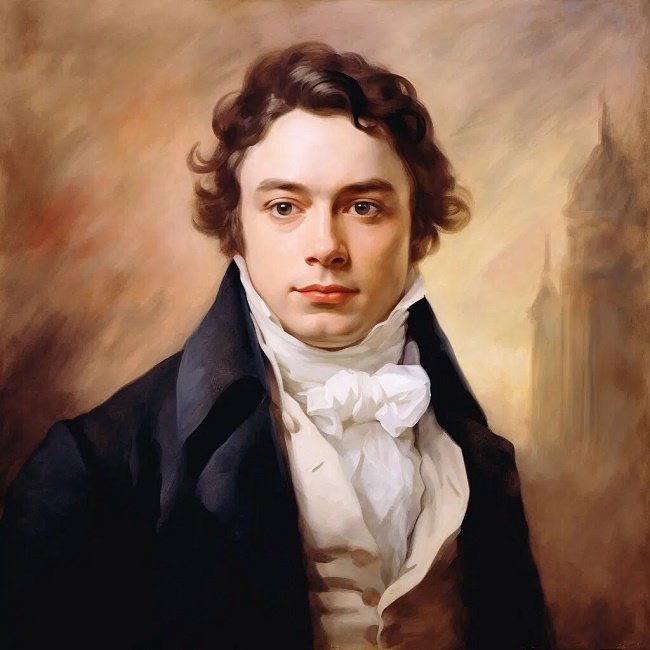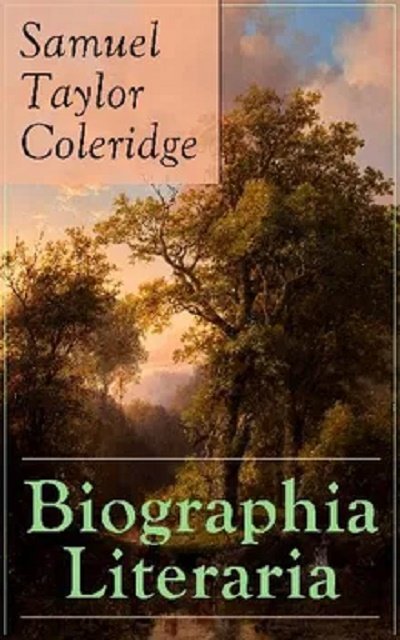Imaginación y poesía en la concepción del poeta S. T. Coleridge (Esp | Eng)
Se cumplen 190 años de la muerte de quien fuera uno de los grandes exponentes del Romanticismo originario, y figura iniciadora del romanticismo inglés. Me refiero al poeta y ensayista inglés Samuel Taylor Coleridege. Coleridge, como suele referirse, y William Wordsworth fueron los que introdujeron la corriente romántica en Inglaterra, sobre todo por la influencia alemana (viajaron juntos a Alemania en 1798). Junto con Wordsworth publicó Baladas líricas en 1798, donde incluyó dos de sus más famosos y trascendentes poemas: Balada del viejo marinero y El ruiseñor; este último de particular relevancia por introducir una modalidad que quedará para la modernidad poética: el poema conversacional ("conversational poem").
Por sus afecciones de salud, comenzó el consumo de opio, que para la época no estaba desautorizado, aunque luego, en su avanzada edad y crisis personal, se convertirá en adicción. Producto de esos estados es quizás el texto autobiográfico y poético Kubla Khan, ideado durante un sueño.

Coleridge cultivó una formación no sólo literaria sino también filosófica. Su visita a Alemania, le permitió entrar en contacto con las obras de ese pensador hito de la filosofía moderna que fue el alemán Inmanuel Kant, y con la de tres escritores Friedrich: Schlegel, Schelling y Schiller, de gran importancia para la literatura moderna.
Así, ya bastante enfermo, durante su estancia en el hogar del médico James Gillman, escribió en 1817, Biographia literaria, un libro integrado por veinticinco capítulos, unos de carácter autobiográfico y otros de naturaleza teórico-filosófica, donde pone por escrito su concepción sobre temas centrales de estética y poesía. A unos fragmentos de esa obra me referiré brevemente a continuación.

En el capítulo XIII expone:
Así pues, considero a la IMAGINACIÓN como, o bien primaria, o bien secundaria. Sostengo que la imaginación primaria es el poder viviente y principal agente de toda percepción humana, y como una repetición en la mente finita del acto eterno de creación en el infinito YO SOY. La imaginación secundaria la considero como un eco de la primaria; coexiste con la voluntad consciente, sin embargo, es siempre idéntica a la primaria en la índole de su acción, difiriendo de ella sólo en grado y en el modo como funciona. Disuelve, difunde, disipa, para recrear (...) Es esencialmente vital (...).
Para Coleridge, como para casi todos los románticos, la imaginación es la potencia que unifica al hombre con el resto de la naturaleza. El hombre crea al modo del Dios creador y como lo hace la naturaleza; ocupa, entonces, su condición natural; he allí la imaginación primaria. La imaginación secundaria, semejante a la primaria, es asumida conscientemente como facultad propia. Aquí se nota la influencia de las ideas de Kant, quien había propuesto que la imaginación tiene una lado reproductivo (o pasivo) y otro productivo (o activo); el primero orientado a la sensibilidad, y el segundo al entendimiento.
Coleridge establece una diferencia entre imaginación y fantasía; así señalará:
La FANTASÍA, al contrario, no tiene otras piezas con las que jugar sino entes fijos y definidos. La fantasía no es, por cierto, otra cosa sino un modo de la memoria emancipado del orden del tiempo y el espacio; y mezclado con, y modificado por, ese fenómeno empírico de la voluntad que expresamos por la palabra ESCOGENCIA.
De este modo, la fantasía no entra en la potencia creadora, sino que actúa por asociación, por entes ya hechos por la percepción; sus productos son —anota el crítico Abrams— "reagrupamientos como de mosaicos hechos con trozos y pedazos".
También conceptualiza Coleridge el poema, del cual formula:
Un poema es una especie de composición que se opone a las obras científicas en cuanto propone por objeto inmediato el placer, no la verdad; y se distingue de todas las otras especies (que tienen este objeto en común con él), en cuanto se propone tal deleite del todo como compatible con una satisfacción separada de cada parte componente.
El placer de la poesía podrá ser, entonces, experimentado tanto en relación con el todo del poema, como con sus partes; por ello dirá que "un poema legítimo o auténtico" "será uno cuyas partes se sustenten y expliquen mutuamente".
Finalmente, una reflexión sobre el poeta:
El poeta, descrito en perfección ideal, activa toda el alma del hombre, con subordinación de sus facultades entre sí, de acuerdo con su relativo valor y dignidad. Difunde un tono y un espíritu de unidad que mezcla y (como si dijésemos) funde cada una de las demás, por ese poder sintético y mágico al que hemos dado exclusivamente el nombre de imaginación.
Fragmento de notoria significación y trascendencia que pone el ejercicio del poeta una condición fundamental: la "forja del alma", como diría el crítico Víctor Krebs, desplegando el poder unitivo de esta.
Referencias | References:
Wordsworth - Coleridge (1987). Baladas líricas. Caracas: Monte Ávila Editores.
Coleridge, T. S. (1982). Balada del viejo marinero y otros poemas. España: Visor.
https://es.wikipedia.org/wiki/Samuel_Taylor_Coleridge
https://en.wikipedia.org/wiki/Samuel_Taylor_Coleridge
https://ministeriodeeducacion.gob.do/docs/biblioteca-virtual/z0he-taylor-coleridge-samuel-balada-del-viejo-marinero-y-otros-poemaspdf.pdf
![Click here to read in english]
Imagination and poetry in the conception of the poet S. T. Coleridge
It has been 190 years since the death of one of the great exponents of early Romanticism, and the initiating figure of English Romanticism. I am referring to the English poet and essayist Samuel Taylor Coleridge. Coleridge, as he is often referred to, and William Wordsworth were the ones who introduced the romantic movement in England, especially due to German influence (they traveled together to Germany in 1798). Together with Wordsworth he published Lyrical Ballads in 1798, which included two of his most famous and transcendent poems: Rime of the Ancient Mariner and The Nightingale; the latter of particular relevance for introducing a modality that will remain in poetic modernity: the conversational poem.
Due to his health problems, he began to consume opium, which at the time was not unauthorized, although later, in his advanced age and personal crisis, it would become an addiction. The product of these states is perhaps the autobiographical and poetic text Kubla Khan, the product of a dream.
Coleridge cultivated not only a literary but also a philosophical education. His visit to Germany brought him into contact with the works of that German thinker, the landmark of modern philosophy, Immanuel Kant, and with those of three writers, Friedrich: Schlegel, Schelling and Schiller, of great importance for modern literature.
Thus, already quite ill, during his stay at the home of the doctor James Gillman, he wrote in 1817, Bigraphia literaria, a book made up of twenty-five chapters, some of an autobiographical character and others of a theoretical-philosophical nature, where he puts into writing his conception of central themes of aesthetics and poetry. I will refer briefly to some fragments of this work below.
In chapter XIII he states:
Thus, I consider IMAGINATION as either primary or secondary. I hold that the primary imagination is the living power and principal agent of all human perception, and as a repetition in the finite mind of the eternal act of creation in the infinite I AM. I consider the secondary imagination as an echo of the primary; It coexists with conscious will, but is always identical to the primary will in the nature of its action, differing from it only in the degree and manner in which it functions. It dissolves, diffuses, dissipates, in order to recreate (...) It is essentially vital (...).
For Coleridge, as for almost all the romantics, imagination is the power that unites man with the rest of nature. Man creates in the manner of the creator God and as nature does; he occupies, then, his natural condition; that is the primary imagination. In the secondary imagination, similar to the primary, it is consciously assumed as a faculty of its own.
Coleridge establishes a difference between imagination and fantasy; he will thus point out:
FANTASY, on the contrary, has no other pieces to play with but fixed and defined entities. Fantasy is, of course, nothing else but a mode of memory emancipated from the order of time and space; and mixed with, and modified by, that empirical phenomenon of the will which we express by the word CHOICE.
In this way, fantasy does not enter into the creative power, but acts by association, by entities already made by perception; its products are –the critic Abrams notes– "regroupings like mosaics made of bits and pieces."
Coleridge also conceptualizes the poem, of which he states:
A poem is a kind of composition which is opposed to scientific works in that it proposes pleasure, not truth, as its immediate object; and it is distinguished from all other species (which have this object in common with it), in that it proposes such delight of the whole as compatible with a separate satisfaction of each component part.
The pleasure of poetry can then be experienced both in relation to the whole of the poem, and to its parts; for this reason he will say that "a legitimate or authentic poem" "will be one whose parts support and explain each other."
Finally, a reflection on the poet:
The poet, described in ideal perfection, activates the whole soul of man, with the subordination of its faculties to each other, according to their relative value and dignity. He diffuses a tone and a spirit of unity that mixes and (as it were) fuses each of the others, by that synthetic and magical power to which we have exclusively given the name of imagination.
A fragment of notable significance and transcendence that places the exercise of the poet as a fundamental condition: the "forging of the soul", as the critic Victor Krebs would say, deploying the unitive power






Esta publicación ha recibido el voto de Literatos, la comunidad de literatura en español en Hive y ha sido compartido en el blog de nuestra cuenta.
¿Quieres contribuir a engrandecer este proyecto? ¡Haz clic aquí y entérate cómo!
Realmente nunca habia escuchado hablar de Coleridege....gracias por ilustrarnos...